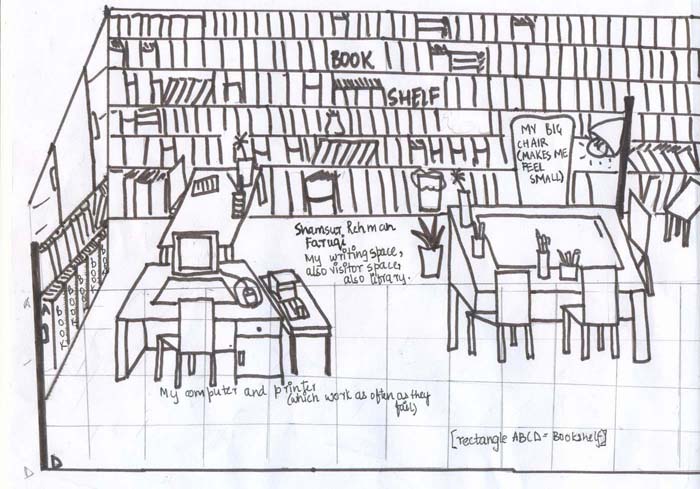
[Click on the image for a very large scan.]

My Writing Space
Shamsur Rahman Faruqi
Funny, it never occurred to me to think of a writing space for me. I must thank the Berlin Festival [which requested information about this] for making me realize that such things exist.
It must be due to my Indo-Muslim upbringing, and also due to the way my life is organized, that I didn’t ever think in terms of having a space of my own. A desk, yes; a room or many rooms and cabinets full of books, yes; a sheaf of papers and a handful of pens, yes; later in life, a computer, yes. But “writing space”? Something that I call my own? I don’t think I ever had that. Remember, I belong to the pre-computer and pre-photocopier age, in fact, even the pre-typewriter age. I never learned to type anyway. Urdu typewriters were frightfully expensive and almost non-existent when I began to write. All of us wrote by hand, and had our manuscripts laboriously copied by a friend or a friend’s friend. That is, if we could be bothered to keep a copy of our text. The great Urdu critic and literary theorist Ehtesham Husain (1912-1972) once told me that he wrote with a very hard pen or a pencil with a carbon paper and blank sheet underneath. Tedious and time-taking and often disappointing, because the carbon image was smudgy and faint.
In Western novels, I often read of people having a private workroom, or library, or a kind of retreat from the din and bustle of a busy household. It was called a “den” and its privacy was practically inviolate. Similarly, people grand enough to have libraries felt entitled to shut themselves up in the library and bar entrance to all but a very few. Well, for us, such things remain in the domain of fiction. We place great value on modesty, but don’t consider privacy to be a necessary concomitant of that virtue.
I confess that occasionally, in the beginning of my writing career, feeling fed up with visitors or phone calls or the comings and goings that are a necessary part of an Indian household, I yearned for a den, or a library of my own where I could write or read undisturbed. But a lifetime of working wherever I could has now immured me from the need to have real peace and quiet for my writing.
I built a biggish house for myself in 1970, but didn’t designate any space in it as my own. I write poetry mostly in bed, or while travelling. I commit the lines to memory, or sometimes write them down as soon as possible. But the main point is that I don’t need any special space, or environment, or background stimulus for writing. For more than thirty years I wrote all my English and Urdu prose by hand, and without regard to having a proper desk even. Now that I have a computer, and have turned the biggest room in my house into a library, I still would like to write by hand as much as possible because the computer and/or the printer keep giving trouble one way or another. Everybody says that there is a mutual, primeval hostility between me and computers. I wrote much of my novel by hand, mostly at night in my bedroom or in my younger daughter’s dining space, and put the pages in the computer at some convenient time. In theory, the computer has made things easy, but I don’t really feel comfortable with it.
My library, and another room, and a few cabinets, are full of a chaos of books. But they make me feel comfortable and at home and content in a strange, almost mystical way. I use the library as an informal living room, meeting area, and teaching area when my grandchildren are here. They make free with my computer but I don’t mind at all.
Here’s a drawing of my library, or informal writing space, made by Tazmeen Amna Siddiqi, my thirteen-year-old granddaughter, from memory. She lives in Delhi where her older sibling Naisan (the photographer) also lives. Naisan is the photographer and musical talent, Tazmeen is the artist and the mimic of the family. They both read and write Urdu as their mother tongue. Tazmeen is also reading German at school. Naisan proposes to learn French at college. Their mother is a Professor of English, the father, an international lawyer.
Tazmeen has drawn the picture as if the south wall of the library, also full of books from floor to ceiling, didn’t exist (or is transparent, as she says). I composed the short text on the drawing. I like the drawing very much. I hope that you do too.
--July 2007